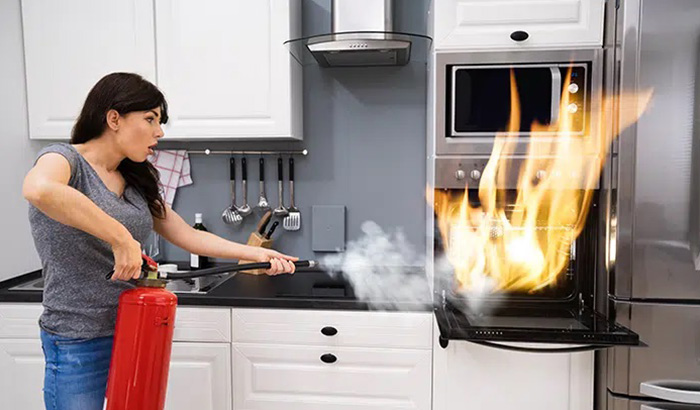The kitchen, often dubbed the heart of the home, is a hub of activity and warmth, where meals are prepared, and memories are made. Yet, amidst the joy of cooking together, it’s essential to prioritize fire prevention strategies to safeguard your loved ones and your home.
Cooking, while a delightful bonding experience, also presents significant fire hazards. It stands as the primary cause of home fires and injuries across the United States. Implementing preventive measures is paramount to minimizing the risk of a potentially devastating fire.
Here are eight essential kitchen fire safety tips to ensure the protection of your household as you navigate culinary endeavors:
- Install and Maintain Smoke Alarms: Smoke detectors are pivotal in early fire detection, providing vital warnings that can make a life-saving difference. Ensure their installation in key areas of your home, especially the kitchen, and regularly test and replace batteries to guarantee functionality.
- Keep a Fire Extinguisher Handy: A kitchen-specific fire extinguisher, such as a Class K extinguisher designed for oil and grease fires, should be easily accessible. Knowing how to operate it using the P.A.S.S. technique (Pull, Aim, Squeeze, Sweep) is crucial for effective fire suppression.
- Never Leave Food Unattended: Vigilance is key; never leave cooking food unsupervised. Avoid multitasking while cooking and focus on preventing potential fire hazards, such as grease spills or unattended stove flames.
- Mind Your Attire: Opt for clothing without loose sleeves or excess fabric that could catch fire. Remove jewelry and avoid loose garments to minimize the risk of accidents while cooking.
- Handle Cooking Oils with Care: Be mindful of cooking oil temperatures and their respective smoke points to prevent accidental ignition. Utilize probe thermometers to monitor temperatures accurately throughout the cooking process.
- Remember to Turn Off Appliances: After cooking, always remember to turn off the oven and stove to mitigate the risk of fire or gas leaks. Utilize reminders such as turning on the exhaust fan or placing sticky notes as prompts.
- Exercise Caution with Children: Teach children kitchen safety protocols and establish clear boundaries to prevent accidents. Keep potentially hazardous items out of their reach and supervise their activities closely while in the kitchen.
- Maintain a Clean Kitchen: Regularly clean kitchen surfaces to prevent the accumulation of flammable grease and clutter. Store flammable materials away from heat sources and maintain organized storage spaces to minimize fire risks.
In the unfortunate event of a house fire, swift action is crucial. Establishing an emergency exit plan, promptly evacuating the premises, and contacting emergency services are vital steps to ensure everyone’s safety. Documenting damage for insurance purposes and seeking professional restoration services promptly are essential for recovery and rebuilding efforts.
